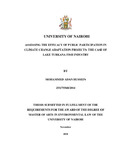| dc.description.abstract | Public participation is a core value of democracy and a principle of national governance in Kenya. Raising and maintaining the awareness of the public on matters of climate change is also a tool that can be deployed efficiently (GoK, 2014). In responding to the challenges posed by climate change, several measures have been put in place including funding of adaptation projects, enactment of various policies, legislations and strategies. However, despite these efforts, some of the adaptation-funded projects have failed to meet their intended objectives even with the involvement of the public. This study therefore sought to assess the efficacy of public participation in climate change adaptation projects in the case of the Lake Turkana Fish Processing industry. Both primary and secondary data were collected and analyzed for this study. Purposive sampling design was used to select the key informants while local respondents were picked through simple random selection. In total, 120 respondents were reached directly through researcher-administered questionnaires. The target population for the study was the Lake Turkana Fishermen Cooperative Society, government institutions, and aid organizations working in the climate change sector. The study found that there were low and poor levels of public participation and consultation processes, which characterized the project under study during the project formulation phase and its implementation. Public opinion and ideas did not also play a role in shaping the design and implementation of the project and hence the project lacked local ownership and influence therefore its failure to meet its intended objectives. Lack of effective public participation is considered to have been contributed among other issues by the absence of an effective legal framework for engaging the public, lack of strong public awareness strategies on their role in designing, implementing and governance of climate change adapation projects, the absence of accountability to measure the levels of public participation and to what extents their opinions could shape the designing, implementing and governance of climate change adaptation projects and lack of strong coordination among the different ministries, departments and organizations working on issues of climate change among others. The study recommends the creation of strategies for strong public awareness on issues of climate change adaptation and specifically the role of the public in the design, implementation and governance of projects that are meant to address these issues. | en_US |



